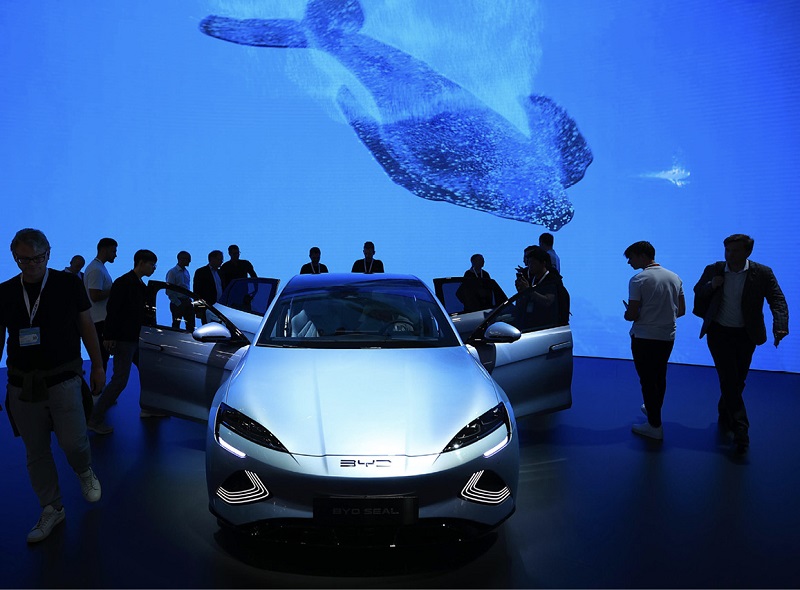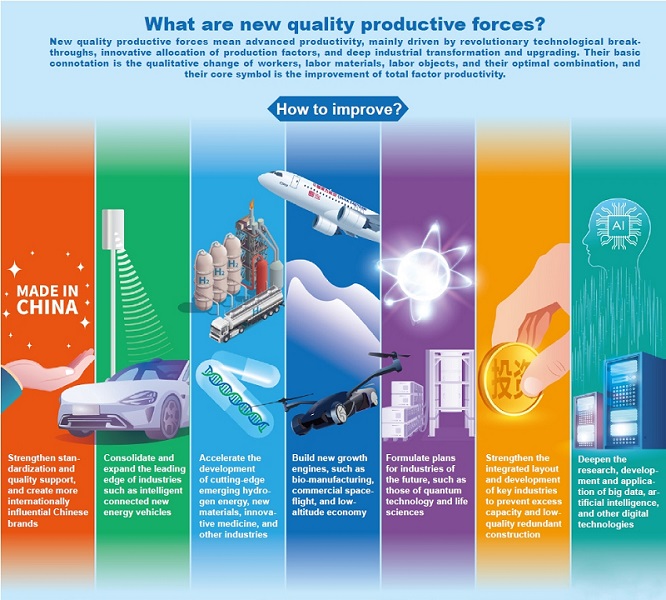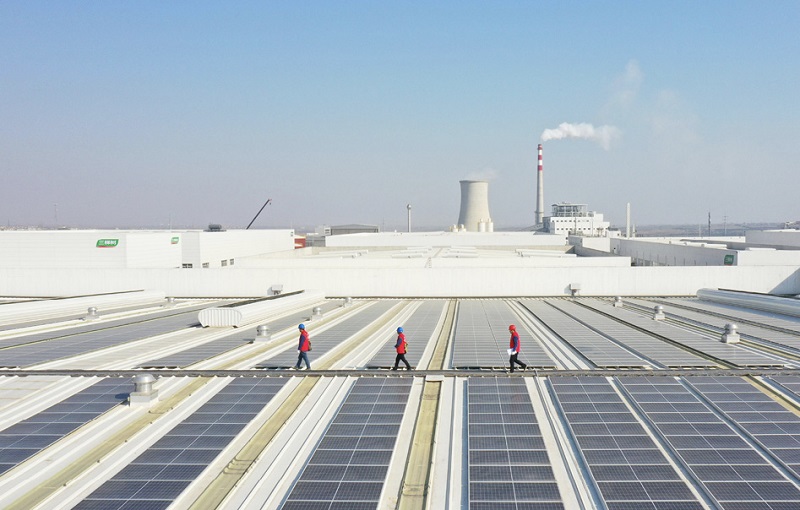
Visitors are inspecting a BYD electric sedan at the Munich Motor Show in Munich, Germany on September 6, 2023.
The C919, China’s self-developed large passenger aircraft, soared into the sky on its maiden commercial flight in May 2023, while the Adora Magic City, China’s first domestically built large cruiseship, set sail on its maiden voyage to northeast Asian destinations in January 2024. The country has achieved one technological breakthrough after another in its endeavor to generate new forces to power its economy.
Chinese President Xi Jinping had elaborated on and highlighted the importance of high-quality development when participating in a deliberation with his fellow National People’s Congress (NPC) deputies from Jiangsu Province on March 5, 2023 during last year’s “Two Sessions,” the annual meetings of China’s top legislature and political advisory body.
On the very same day this year, during deliberations with his fellow deputies from the Jiangsu Province delegation at the second session of the 14th NPC, President Xi reiterated the importance of developing new quality productive forces according to local conditions.
Developing new quality productive forces is an imperative requirement and pivot of high-quality development. Xi’s dedication to this mission will drive China’s pursuit of high-quality development as the country strives to build a modern socialist country in all respects.
A New Term Comes to the Fore
President Xi Jinping first proposed the concept of new quality productive forces in September 2023 during his inspection trip to northeast China’s Heilongjiang Province, when he said, “Sci-tech innovation resources should be integrated to spearhead the development of strategic emerging industries and future industries so as to form new quality productive forces.”
When, in December 2023, the Central Economic Work Conference set out its plans for 2024, the clear message that emerged was the need for China to focus that year on promoting high-quality development, giving prominence to key areas, grasping key points, and taking a down-to-earth approach to economic work. New quality productive forces once more came under the spotlight when the meeting proposed: “We will promote industrial innovation through technological innovation, especially by using ground-breaking and cutting-edge technologies to foster new industries, new models, and growth drivers, and develop new quality productive forces.”
In January 2024, at the 11th group study session of the Political Bureau of the Communist Party of China (CPC) Central Committee, President Xi Jinping explained new quality productive forces, when he said, “The new quality productive forces are primarily driven by innovation, and break free from traditional economic growth modes and productivity development paths. Featuring high technology, high efficiency, and high quality, they constitute the advanced productivity that comes in line with the new development philosophy.” The term hence refers to hi-tech sectors, including new energy vehicles (NEVs), artificial intelligence, advanced manufacturing, and quantum computing.
New quality productive forces have contributed to China’s high-quality development. The statistical communiqué, published by the National Bureau of Statistics of China on February 29, 2024 on national economic and social development in 2023 shows that new drivers of growth witnessed robust development that year, China’s NEV output having hit 9.443 million, up 30.3 percent year-on-year. There have also been reports that in the final quarter of 2023 Shenzhen-based Chinese carmaker BYD became the world’s best-selling electric vehicle maker, and hence the first to surpass Tesla.
China’s solar cell (photovoltaic cells) output, moreover, was 540 million kilowatts, up 54 percent year-on-year. Meanwhile that of service robots reached 7.833 million, up by 23.3 percent; and that of 3D printing devices totaled 2.789 million, a 36.2 percent increase. These figures accentuate the growing importance to China’s development of new quality productive forces.
While taking part in deliberations with his fellow deputies from Jiangsu Province at this year’s “Two Sessions,” President Xi Jinping pinpointed the top priorities of high-quality development, which entails stepped-up innovation, fostering of emerging industries, adoption of forward-thinking plans for developing future-oriented industries, and improving the modernized industrial system.
Xi made clear that “developing new quality productive forces does not mean neglecting or abandoning traditional industries.” Instead, they should be developed according to local conditions. “It is necessary to prevent a headlong rush into projects and the formation of industry bubbles, and to avoid adopting just a single development model,” President Xi said.
Jiangsu’s New Quality Productive Forces
Jiangsu Province’s 2024 Report on the Work of the Government showed that, in 2023, the provincial GDP reached RMB 12.82 trillion – a 5.8 percent increase – so ranking second in China. As a major manufacturing province, Jiangsu’s economic growth has considerably benefited from new quality productive forces.
The manufacturing industry’s added value in Jiangsu reached RMB 4.66 trillion, accounting for 36.3 percent of the regional GDP, with its high-quality development manufacturing industry index hitting 91.9, ranking first in the country. The output value of Jiangsu’s strategic emerging and hi-tech industries, meanwhile, accounted for 41.3 percent and 49.9 percent of industries above the designated scale, respectively.
On visiting the Suzhou Industrial Park during his inspection of Jiangsu in 2023, Xi Jinping highlighted the importance of fostering new industries and accelerating industrial upgrading by leveraging new technologies.
During this tour, Xi Jinping called on Jiangsu Province to sustain its exemplary role in promoting reform, innovation, and high-quality development, as well as in contributing to China’s efforts to foster a new pattern of development.
NPC deputy Gao Jifan, who comes from Jiangsu Province, is head of Trina Solar, a leading photovoltaics company in China. Gao told reporters ahead of the second session of the 14th NPC that China’s photovoltaic industry had evolved from an initial state where technology, market, and equipment were all lagging behand globally to today’s situation with the world’s largest market size, leading technology level, and the most complete industrial chain.
Aware that Gao Jifan is also head of a state key laboratory of PV science and technology, Xi asked him, at the group deliberation on March 5, “Where’s your laboratory?” Gao answered, “It’s located in both Changzhou of Jiangsu Province and Shanghai City. It’s jointly established by enterprises and universities, integrating basic research, frontier research, and applied research.”
“Jiangsu enjoys favorable conditions and capabilities for developing new quality productive forces,” Xi said at the group deliberation, adding, “Facing the latest round of scientific and technological revolutions and industrial transformations, we must seize opportunities and strengthen efforts to make innovations. We must also cultivate and strengthen emerging industries, arrange the development of industries for the future in advance, and improve the modern industrial system.”
During the past year, Jiangsu’s technological innovations have made steady progress. The deep-sea manned submersible Fendouzhe, developed under the initiation of the province’s Taihu Laboratory, dived to the Mariana trench – the world’s deepest natural trench – in the west Pacific. The high-efficiency all-perovskite tandem solar cells developed by a team of Chinese scientists were also among China’s top 10 scientific advances, to name a few.
Jiangsu’s example represents a microcosm of the country. In 2023, China’s NEV, lithium-ion battery, and photovoltaic product output increased by 30 percent. China also makes up 60 percent or more of global electric vehicle output and sales, a momentum that is expected to grow.

Develop New Quality Productive Forces
President Xi once observed, “Scientific and technological innovation can generate new industries, new models, and new momentum, and is the core element for developing new quality productive forces.” Therefore, developing new quality productive forces entails the country’s giving full play to technological innovation.
“We must strengthen scientific and technological innovation, especially original and disruptive innovations, accelerate efforts to build high-level self-reliance and strength in science and technology, achieve breakthroughs in core technologies in key fields so that original and disruptive scientific and technological innovations can emerge one after another, and generate greater momentum towards the development of new productive forces,” Xi said.
Promoting technological innovation means greater policy support. In his 2024 government work report, Premier Li Qiang said that the country’s top priority is to modernize the industrial system and develop new quality productive forces at a faster pace, which entails efforts to launch an AI Plus initiative. Before this year’s “Two Sessions,” many local governments had already pledged in their work reports to foster new quality productive forces.
For example, Beijing’s government proposed accelerating its cultivation of new quality productive forces in the new year, as this will facilitate the growth of strategic emerging industries – such as new energy, new materials, commercial spaceflight, and the low-altitude economy – and develop future-oriented industries such as quantum tech, life sciences, and 6G.
Such innovation also means more R&D funding. According to Minister of Science and Technology Yin Hejun, China’s R&D spending in 2023 surpassed RMB 3.3 trillion, up 8.1 percent compared with the previous year, of which funding for basic research reached RMB 221.2 billion, a 9.3 percent increase over the previous year.
Such investment has yielded fruitful results, with the signing of 950,000 new technology contracts that produced a transaction volume of RMB 6.15 trillion, a 28.6 percent year-on-year increase, and the granting of 921,000 invention patents, up 15.3 percent compared with the previous year. Yin indicated that investment in scientific and technological research is set to increase in the near future.
On March 6, while visiting national political advisors from the Revolutionary Committee of the Chinese Kuomintang, the sector of science and technology, and the sector of environment and resources, Xi Jinping called on political advisors and all in the science and technology sector to strengthen basic research and applied basic research, go all out to make breakthroughs in core technologies in key fields, and create new drivers for developing new quality productive forces.
Talent is also integral to developing new quality productive forces. According to a People’s Daily report, NPC deputy Sun Jingnan, a welder from the CRRC Nanjing Puzhen Co., told Xi at the group discussion that she has witnessed the development of China’s railway transportation from being a “follower” to “leader,” and believes that craftsmen must pay particular attention to the details and nuances of their field, in order to achieve necessary breakthroughs.
In response, Xi recalled the Chinese transportation industry’s achievements, saying that craftsmen are the cornerstone and pillars of the Chinese nation’s edifice, and also constitute the crucial impetus behind the step-by-step advance of China’s transportation industry. “Having good design blueprints isn’t enough; in the end, the industry’s success lies in the hands of welders like Sun Jingnan.” Xi went on to highlight the importance of enhancing China’s vocational education, and nurturing the spirit of craftsmanship.

Electrical engineers are carrying out routine wintertime maintenance work at a photovoltaic power station in Mingguang City of east China’s Anhui Province on December 31, 2021.
International Response
New quality productive forces having become a buzzword in China during the “Two Sessions,” it has sparked widespread discussions among many international observers.
Jon Taylor from the University of Texas at San Antonio told the BBC that new quality productive forces place “an emphasis on the development and commercialization of technology and science, digitization, and high-end manufacturing centering on emerging intelligent and eco-friendly technologies.”
Keith Bennett, a long-term China specialist and vice chair of Britain’s 48 Group Club, told Xinhua that he believes President Xi’s important exposition on developing new quality productive forces keeps up with the times, and also meets the demands of the times, adding that the concept may reduce hard labor, improve the ecological environment, enhance the quality of people’s lives, and ensure a green economy.
Andy Mok, a senior research fellow at the Center for China and Globalization, told China Today that growing numbers of foreign companies now realize that to prosper in China, they must ensure they can keep up with the latest technological breakthroughs, product innovations, and business model innovations. Many foreign companies are aware that their development in China is not just for the benefit of the Chinese market, but that it also enhances their own global competitiveness. “All new technologies play a vital role in promoting the prosperity of the global economy.”